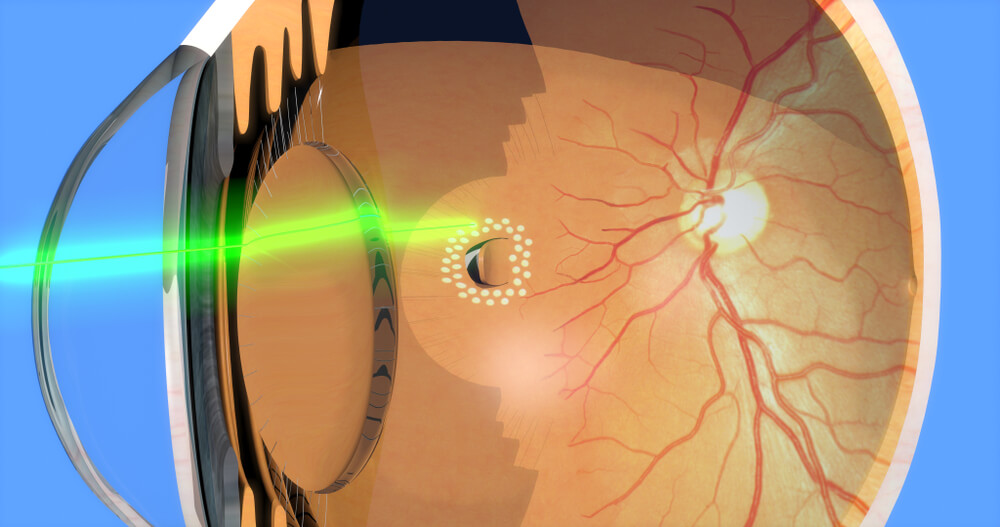Retinal laser surgery, or retinal laser photocoagulation, is one of the more common procedures for treating retinal disorders, including retinal tears, age-related macular degeneration, and diabetic retinopathy.
During this in-office treatment, doctors use a thermal laser to create small burns in the retina. As these burns heal, they seal off tears or leaking blood vessels, holding the retina in place and preventing further damage. While laser surgery cannot restore any existing vision loss, it can be immensely helpful for maintaining current vision and ensuring that further damage does not occur.
Keep reading to learn more about retinal laser photocoagulation and its varied applications in treating retinal disorders.

The retina plays a crucial role in vision and overall eye health. Its main responsibility is to capture the light you see and convert it into electrical signals that the brain can then translate into images. For those with a retinal disorder, retinal laser surgery offers a non-invasive approach to preserving this function and maintaining vision. In many cases, it’s one of the best retinal tear treatment options available, providing a safe and effective solution for healing tears and strengthening retinal tissue.
The term “surgery” may sound scary, but as far as retinal procedures go, a retinal tear treatment with a laser is actually rather quick and simple. The whole thing takes only about five to 10 minutes and should be completely painless.
To perform the procedure, your doctor will:
There are three types of lasers that may be used in retinal surgery: green, red, and yellow. Green lasers help secure the retina in place; red lasers help treat the retina when blood is present; and yellow lasers help with sealing leaky blood vessels.
You’ll likely see bright flashes of light during the procedure. When it’s completed, your doctor will provide you with special eye drops to prevent swelling and infection as your eyes heal. Post-operative care is straightforward and includes ongoing use of these eye drops plus a momentary pause on heavy lifting or other strenuous activities.
The recovery time for laser photocoagulation is one to four weeks. Possible side effects include blurred vision, difficulty focusing, blind spots, mild vision loss, or increased sensitivity to light.
Laser photocoagulation is commonly used as a retinal tear or retinal hole laser treatment, but it has quite a bit more utility beyond that.
Diabetic retinopathy is a disorder that occurs in diabetics when high blood sugar damages blood vessels in the retina. In the early stages of diabetic retinopathy, blood vessels can weaken and leak. As the condition progresses, they can close off completely, and/or abnormal blood vessels can grow, leading to vision loss.
Retinal laser photocoagulation cannot reverse the damage of diabetic retinopathy. It can, however, shrink swollen blood vessels and stop them from leaking. This helps preserve vision and stop the formation of abnormal new blood vessels in the retina.
A retinal tear is often due to aging and occurs when the retina starts to detach from its normal position. Left untreated, this can lead to complete retinal detachment and loss of vision, as well as bleeding in the eye.
Fortunately, a retinal tear treatment with a laser can be incredibly effective, with success rates of 90% and higher. The procedure is especially useful for treating tears at the earliest possible chance, when the retina has not yet undergone a complete detachment, and can help bolster the retina in place.
Age-related macular degeneration (AMD) impacts the central part of the retina, known as the macula. In particular, AMD causes blood vessels to form beneath the macula and excess blood and fluid to leak within the retina.
Laser photocoagulation seals off these leaky blood vessels to help preserve vision and prevent further vision loss. However, while it can be very effective, laser surgery can potentially cause damage to healthy tissue surrounding the macula, and it is not always the best course of action. Your doctor may recommend another AMD treatment instead, such as certain drugs that have been shown to slow the growth of abnormal blood vessels.
Laser surgery is a major advancement in the treatment of various retinal conditions. Suppose you are suffering from one of the conditions mentioned above or another retinal condition, such as macular edema or retinal vein occlusion. In that case, we encourage you to consult with a retinal specialist about laser photocoagulation and how it may be able to help you.
Our team at Mid Atlantic Retina has extensive experience in the treatment of retinal diseases and offers laser photocoagulation and other proven retinal treatments at our clinics throughout Pennsylvania. Learn more about our services, and contact Mid Atlantic Retina today to schedule a consultation with one of our board-certified retina specialists.